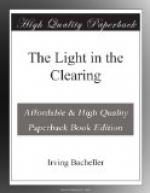We walked out of the graveyard together in silence. Dimly above a distant ridge I could see stark, dead timber looming on a scarlet cloud in the twilight. It is curious how carefully one notes the setting of the scene in which his spirit has been deeply stirred.
I could see a glimmer of a light in the thicket of pines down the valley. I unhitched and mounted my horse.
“Take the first turn to the right,” said the old man as he picked up his scythe.
“I’m very much obliged to you,” I said.
“No ye ain’t, nuther,” he answered. “Leastways there ain’t no reason why ye should be.”
My horse, impatient as ever to find the end of the road, hurried me along and in a moment or two we were down under the pine grove that surrounded the house of old Squire Fullerton—a big, stone house with a graveled road around it. A great black dog came barking and growling at me from the front porch. I rode around the house and he followed. Beyond the windows I could see the gleam of candle-light and moving figures. A man came out of the back door as I neared it.
“Who’s there?” he demanded.
“My name is Barton Baynes from St. Lawrence County. Kate Fullerton is my friend and I wish to see her.”
“Come up to the steps, sor. Don’t git off yer horse—’til I’ve chained the dog. Kate’ll be out in a minute.”
He chained the dog to the hitching post and as he did so a loud, long, wailing cry broke the silence of the house. It put me in mind of the complaint of the damned which I remembered hearing the minister describe years before at the little schoolhouse in Lickitysplit. How it harrowed me!
The man went into the house. Soon he came out of the door with a lighted candle in his hand, a woman following. How vividly I remember the little murmur of delight that came from her lips when he held the candle so that its light fell upon my face! I jumped off my horse and gave the reins to the man and put my arms around the poor woman, whom I loved for her sorrows and for my debt to her, and rained kisses upon her withered cheek. Oh God! what a moment it was for both of us!
The way she held me to her breast and patted my shoulder and said “my boy!”—in a low, faint, treble voice so like that of a child—it is one of the best memories that I take with me into the new life now so near, from which there is no returning.
“My boy!’” Did it mean that she had appointed me to be a kind of proxy for the one she had lost and that she had given to me the affection which God had stored in her heart for him? Of that, I know only what may be conveyed by strong but unspoken assurance.
She led me into the house. She looked very neat now—in a black gown over which was a spotless white apron and collar of lace—and much more slender than when I had seen her last. She took me into a large room in the front of the house with a carpet and furniture, handsome once but now worn and decrepit. Old, time-stained engravings of scenes from the Bible, framed in wood, hung on the walls.




